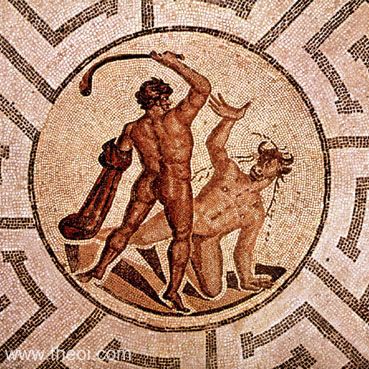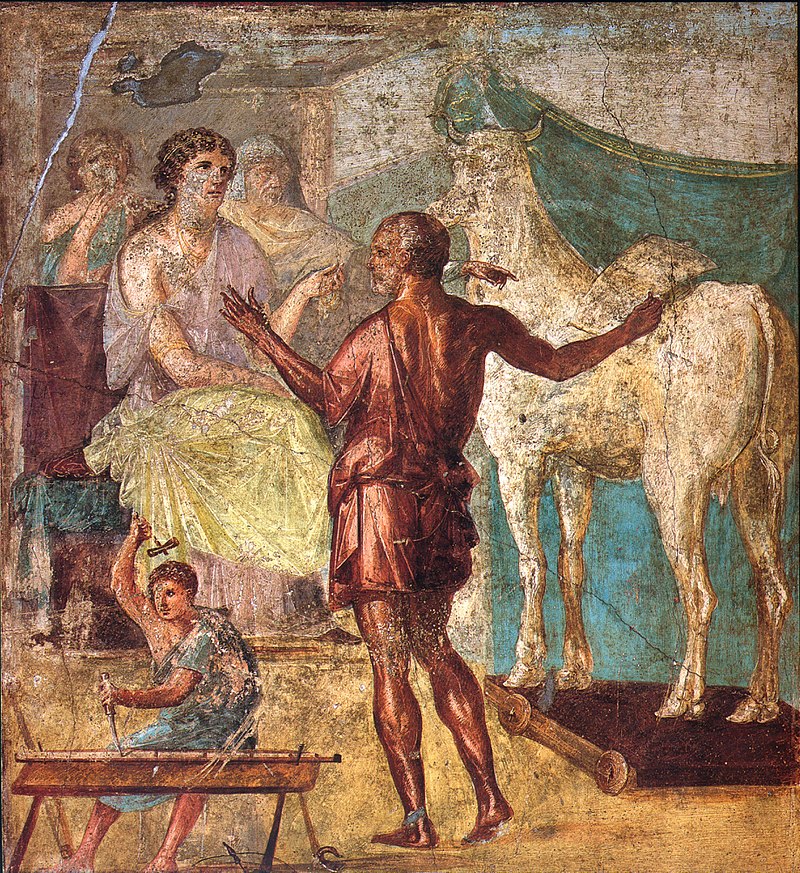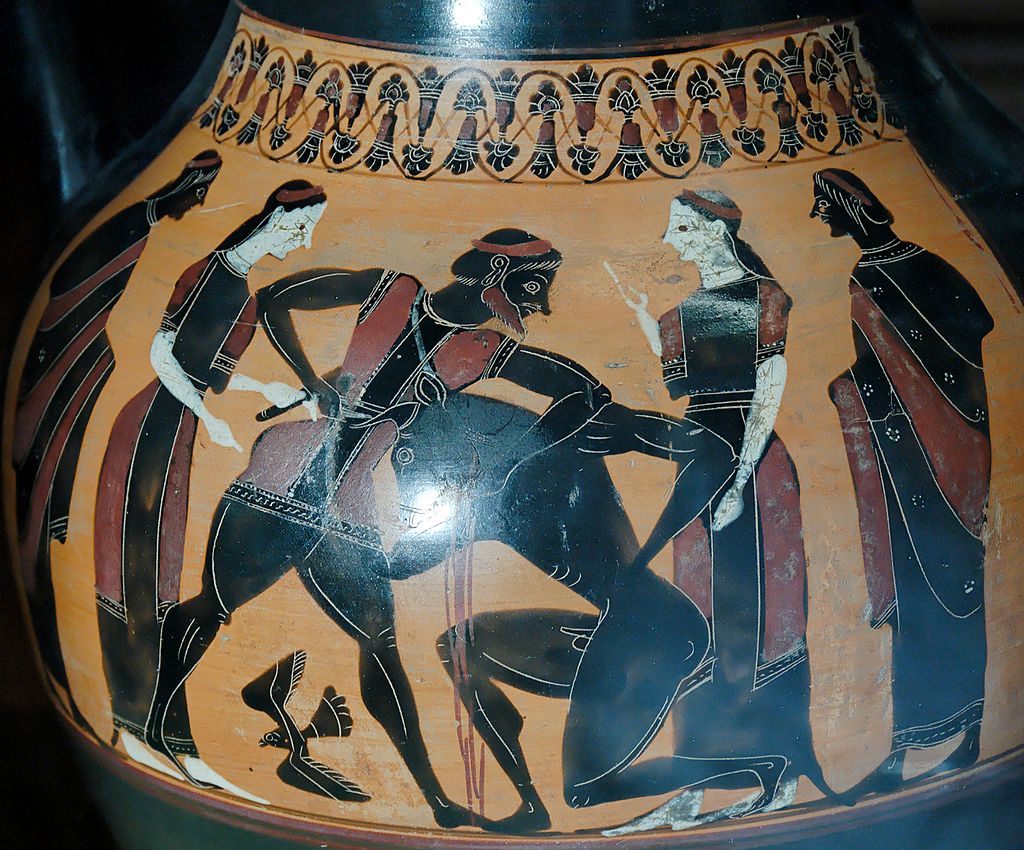Theseus
Theseus, a legendary figure born from the union of a mortal and a god, rose to become the king and founding hero of Athens. His name echoed through the ages as a slayer of monstrous beasts and a champion who united the city-state.

Parents: Aegeus and Aethra
Siblings: Clymene
Consort: Ariadne
The Minotaur
A shadow of horror lurked within the walls of King Minos’ palace on Crete. Pasiphae, the queen, consumed by an unnatural desire, had birthed a monstrous creature – the Minotaur, half-man and half-bull. Shame and fear warred within Minos. Unwilling to slay his own twisted offspring, he instead imprisoned the Minotaur within a labyrinth, a nightmarish maze designed by the ingenious but troubled Daedalus.

This monstrous secret had deadly consequences. When Minos’ son, Androgeus, traveled to Athens to compete in the Panathenaic Games, he was murdered, the victim of the same dark desires that had birthed the Minotaur. Grief and fury contorted Minos’ heart. He demanded a horrifying tribute from Athens – seven young men and women every year, destined to become nothing more than sacrifices to the insatiable hunger of the Minotaur.
Years passed, the screams of Athenian youths echoing in the labyrinth’s depths. Then, a glimmer of hope emerged in the form of Theseus, son of King Aegeus. Driven by a potent mix of courage and filial duty, Theseus volunteered to be one of the tributes. His heart ached for the suffering Athenians, but a deeper motive fueled his resolve. He would slay the Minotaur, free the city from this barbaric tribute, and perhaps, in the process, earn his father’s respect.

Aegeus, his face etched with worry, pleaded with Theseus to reconsider. The labyrinth was a death trap, the Minotaur an unstoppable nightmare. But Theseus was undeterred. He made a pact with his father – upon his return, if he had slain the beast, the ship’s sails would be white, a beacon of hope for Athens. Black sails, however, would signal his demise, a grim reminder of the Minotaur’s insatiable hunger. With a heavy heart, Aegeus watched his son sail away, a tiny speck on the horizon, carrying the weight of Athens’ freedom on his shoulders.
Theseus and the Minotaur
Crete loomed before Theseus, a place shrouded in dread and the Minotaur’s insatiable hunger. He announced his intention to slay the beast to King Minos, a flicker of defiance in his voice. Minos, however, offered a chilling smile. Even if Theseus succeeded, the labyrinth, a tangled maze designed by the brilliant Daedalus, would ensure his demise.

But fate, it seemed, wasn’t entirely against Theseus. He found an unexpected ally in Ariadne, King Minos’ daughter. Captivated by Theseus’ courage and determination, she defied her own father, her heart stirred by a burgeoning love. In the dead of night, she snuck into Theseus’ chambers, her hands clutching a precious gift – a ball of golden thread.
“Unravel it,” she whispered, her voice trembling with both fear and hope, “as you delve deeper into the labyrinth’s darkness. It will guide you back to the light, a lifeline out of this monstrous prison.”
Theseus, his heart swelling with gratitude, accepted the thread. With a final, lingering glance at Ariadne, he ventured into the labyrinth. The air grew thick and stale, the oppressive silence broken only by the pounding of his own heart. He unraveled the golden thread, a luminous path through the maze’s treacherous twists and turns.

Finally, after what seemed like an eternity, he found the monstrous Minotaur. A primal roar echoed through the chamber as the beast charged, its eyes burning with a feral hunger. A fierce battle ensued, the stench of blood and sweat filling the air. But Theseus, fueled by a desire for freedom and a promise to the girl who had risked everything for him, fought with the fury of a cornered lion. With a final, resounding blow, he brought the Minotaur down.
Exhausted but victorious, Theseus knew his ordeal wasn’t over. Following the golden thread, a shimmering beacon in the darkness, he retraced his steps, the labyrinth’s secrets slowly unraveling before him. He emerged, blinking in the sunlight, the fresh air a balm to his lungs. Ariadne awaited him, her face a canvas of relief and joy.
Together, they escaped Crete, Theseus a hero, Ariadne a fugitive who had dared to defy her own blood. As their ship sailed towards Athens, the promise of a new life bloomed on the horizon, forever intertwined with the golden thread that had led them both out of the darkness.
Voyage Back to Athens
Their escape from Crete wasn’t the end of their journey. They landed on Naxos, a sun-drenched island, where the Athenians reveled in a celebratory feast that stretched long into the night. Amidst the revelry, Ariadne, overcome by exhaustion and perhaps the potent island wine, fell asleep on the shore.
This is where the accounts diverge, leaving a bitter stain on Theseus’ heroism. Some whispers paint him as a pawn in the gods’ machinations, forced to abandon Ariadne on Naxos at the behest of Dionysus, the god of wine and revelry. Others cast a harsher light, portraying him as a man who, having achieved his victory, callously discarded the woman who had aided him.

Whatever the reason, Theseus set sail from Naxos, leaving Ariadne behind. In his haste, or perhaps consumed by guilt, he neglected to raise the white sails, the prearranged signal of his triumph. From afar, King Aegeus, his heart heavy with anticipation, watched the horizon. A speck appeared, growing larger as it neared the coast. But instead of the white promise of victory, he saw the black sails billowing in the wind.
Grief, thick and suffocating, washed over Aegeus. Believing his son lost, consumed by despair, he threw himself from the cliffs of Sounion, a final act of desperation that claimed his life. The very sea that witnessed his tragic fall would forever bear his name – the Aegean Sea, a constant reminder of a father’s love and a hero’s devastating mistake.
